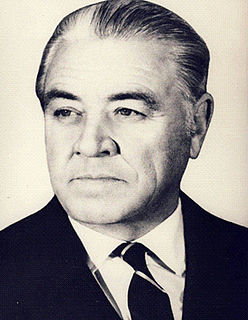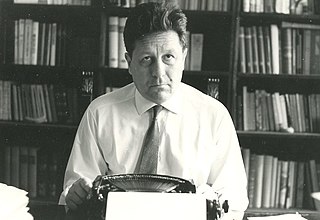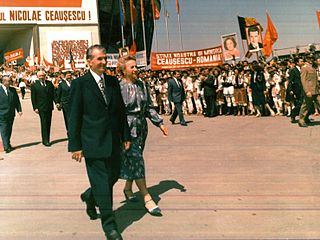Related Research Articles

Ion Antonescu was a Romanian military officer and marshal who presided over two successive wartime dictatorships as Prime Minister and Conducător during most of World War II. After the war, he was executed.
Mircea Dinescu is a Romanian poet, journalist, and editor.

The Socialist Republic of Romania was a Marxist–Leninist one-party communist state that existed officially in Romania from 1947 to 1989. From 1947 to 1965, the state was known as the Romanian People's Republic. The country was an Eastern Bloc state and a member of the Warsaw Pact with a dominant role for the Romanian Communist Party enshrined in its constitutions. Geographically, Romania bordered the Black Sea to the east; the Soviet Union to the north and east; Hungary and Yugoslavia to the west and Bulgaria to the south.

Ion Gheorghe Iosif Maurer was a Romanian communist politician and lawyer, and the 49th Prime Minister of Romania. He is the longest serving prime-minister in history of Romania.

Eugen Barbu was a Romanian modern novelist, short story writer, journalist, and correspondent member of the Romanian Academy. The latter position was vehemently criticized by those who contended that he plagiarized in his novel Incognito and for the anti-Semitic campaigns he initiated in the newspapers Săptămâna and România Mare which he founded and led. He also founded, alongside his disciple Corneliu Vadim Tudor, the nationalist Greater Romania Party (PRM).

The Romanian Communist Party was a communist party in Romania. Successor to the pro-Bolshevik wing of the Socialist Party of Romania, it gave ideological endorsement to a communist revolution that would replace the social system of the Kingdom of Romania. After being outlawed in 1924, the PCR remained a minor and illegal grouping for much of the interwar period, and submitted to direct Comintern control. During the 1920s and 1930s, most of its activists were imprisoned or took refuge in the Soviet Union, which led to the creation of competing factions which at times came in open conflict. This did not prevent the party from participating in the political life of the country through various front organizations, most notably the Peasant Workers' Bloc. The Communist Party emerged as a powerful actor on the Romanian political scene in August 1944, when it became involved in the royal coup that toppled the pro-Nazi government of Ion Antonescu. With support from Soviet occupational forces, the PCR was able to pressure King Michael I into abdicating, and establish the Romanian People's Republic in December 1947.

The Rebellion of Brașov was a revolt against Nicolae Ceaușescu's economic policies in Communist Romania, which erupted on the day of the 1987 local election.
Paul Goma was a Romanian writer, known for his activities as a dissident and leading opponent of the communist regime before 1989. Forced into exile by the communist authorities, he became a political refugee and resided in France as a stateless person. After 2000, Goma has expressed opinions on World War II, the Holocaust in Romania and the Jews, claims which have led to widespread allegations of antisemitism.

SLOMR was a Romanian free trade union founded, without prior preparation, in February 1979, as a means to oppose the control exercised by the ruling Communist Party during the country's communist period. Initiated along the same lines as Solidarity, created one year later in the People's Republic of Poland, it grew to about 2,400 adherents within four weeks, and was dismantled by the authorities of Nicolae Ceaușescu's regime, coordinated by the Securitate, over the next three months.
Alexandru Nicolschi was a Romanian communist activist, Soviet agent and officer, and Securitate chief under the Communist regime. Active until 1961, he was one of the most recognizable leaders of violent political repression.

The July Theses is a name commonly given to a speech delivered by Romanian General Secretary of the Romanian Communist Party|leader Nicolae Ceaușescu on July 6, 1971, before the Executive Committee of the Romanian Communist Party (PCR). Its full name was Propuneri de măsuri pentru îmbunătățirea activității politico-ideologice, de educare marxist-leninistă a membrilor de partid, a tuturor oamenilor muncii. This quasi-Maoist speech marked the beginning of a "mini cultural revolution" in the Socialist Republic of Romania, launching a Neo-Stalinist offensive against cultural autonomy, a return to the strict guidelines of socialist realism and attacks on non-compliant intellectuals. Strict ideological conformity in the humanities and social sciences was demanded. Competence and aesthetics were to be replaced by ideology; professionals were to be replaced by agitators; and culture was once again to become an instrument for communist propaganda.

The Jiu Valley miners' strike of 1977 was the largest protest movement against the Communist regime in Romania before its final days, ushering in a period of intermittent labour unrest that would last a dozen years, and the most important challenge posed by a group of workers to the regime since the protests triggered by the Hungarian Revolution of 1956. It took place 1–3 August 1977 and was centred in the mining town of Lupeni, in Transylvania's Jiu Valley.
Tudor Postelnicu was a Romanian Communist politician, who served as Interior Minister from October 1987 until the 1989 Revolution.

During the Cold War, Romanian dictator Nicolae Ceaușescu presided over the most pervasive cult of personality within the Eastern Bloc. Inspired by the personality cult surrounding Kim Il-sung in North Korea, it started with the 1971 July Theses which reversed the liberalization of the 1960s, imposed a strict nationalist ideology, established Stalinist totalitarianism and a return to socialist realism. Initially, the cult of personality was just focused on Ceaușescu himself. By the early 1980s, however, his wife, Elena Ceaușescu—one of the few spouses of a Communist leader to become a power in her own right—was also a focus of the cult.

The issue of Bessarabia in Romania–Soviet Union relations was originally avoided in the 1950s, but as Romania began to distance itself from the Soviet Union, the issue of Bessarabia was brought up in Romanian public discourse whenever relations between the two countries soured.

Dissent in Romania under Nicolae Ceaușescu describes the voicing of disagreements with the government policies of Communist Romania during the totalitarian rule of Nicolae Ceaușescu after the July Theses in 1971. Because of Ceaușescu's extensive secret police and harsh punishments, open dissent was rare. Notable acts of dissent include Paul Goma's 1977 letters to Ceaușescu, the founding of SLOMR in 1979 and a number of work conflicts, such as the Jiu Valley miners' strike of 1977 and the Braşov Rebellion of 1987.

The Orthodox Church in Communist Romania was the period in the history of the Romanian Orthodox Church that spanned between 1947 and 1989, the era in which Romania was a socialist state. The regime's relationship with the Orthodox Church was ambiguous: while it declared itself "atheist", it actively collaborated with the Church, and, during the Ceaușescu era, the government used the Orthodox Church as part of his promotion of national identity.
Săptămîna was a newspaper published in the Socialist Republic of Romania focusing on Bucharest's cultural scene. During the 1980s, the leading editors were Eugen Barbu and Corneliu Vadim Tudor and the newspaper had very strong pro-Nicolae Ceaușescu and National Communist views and it attacked and slandered detractors of Ceaușescu, both those living in Romania and those living in the exile.

Dennis Deletant is a British historian of the history of Romania. As of 2019, he is Visiting Ion Rațiu Professor of Romanian Studies at Georgetown University and Emeritus Professor of Romanian Studies at the UCL School of Slavonic and East European Studies (SSEES). He is the author of numerous works on the history of Romania including Ceauşescu and the Securitate: Coercion and Dissent in Romania, 1965-89 ; Romania under Communist Rule ; Communist Terror in Romania: Gheorghiu-Dej and the Police State, 1948-1965 ; and Ion Antonescu: Hitler’s Forgotten Ally.

The Romanian rural systematization program was a social engineering program undertaken by Nicolae Ceaușescu's Romania primarily at the end of the 1980s. The legal framework for this program was established as early as 1974, but it only began in earnest in March 1988, after the Romanian authorities renounced most favoured nation status and the American human rights scrutiny which came with it. The declared aim of this program was to eliminate the differences between urban and rural, by the means of razing half of Romania's 13,000 villages and moving their residents into hundreds of new "agro-industrial centers" by 2000. The program gained notoriety in Europe, with protests from multiple countries – chiefly Hungary – as well as a Belgian-led initiative to save the Romanian villages by "adopting" them. Within a year, on 18 April 1989, the first batch of 23 new agro-industrial towns was completed. Only one new town was created between 1974 and 1988, as Ceaușescu focused his attention on other projects. Although cut short by the Romanian Revolution in December 1989, at least three more rural settlements in an advanced state of systematization were, ultimately, transformed into towns as well.
References
- Deletant, Dennis (1995). Ceaușescu and the Securitate: Coercion and Dissent in Romania, 1965-1989. London: M.E. Sharpe. ISBN 1-56324-633-3.